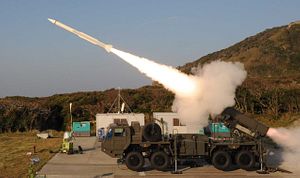The Japan Ground Self-Defense Force (JGSDF) has successfully test-fired the Chu-SAM Kai surface-to-air missile, destroying 100 percent of its targets at the White Sands Missile Range in southern New Mexico, the United States Army website reports.
Over the summer of 2015, the JGSDF conducted ten flight tests intercepting various targets, including a GQM-163A Coyote target system used to simulate supersonic cruise missiles.
The Chu-SAM Kai is an advanced version of the Chu-SAM medium range surface-to-air missile system domestically developed and produced in Japan. It is a multi-segment propellant missile launched from a road-mobile vertical launch container and has been undergoing evaluation and testing since 2014.
“Development of Chu-SAM(KAI) is aimed at increasing the capability against threats such as cruise missile. By applying advanced sensor and network technologies, Chu-SAM (KAI) increases a defense area against cruise missile, while reduces acquisition cost,” Japan’s Ministry of Defense (MOD) explains [sic].
Like the Chu-SAM, the Chu-SAM Kai air defense system is based “on 8×8 cross country trucks, including command center, radar unit, launcher, and transloader. The trucks are not armored and the system is not protected in any way,” according to the website weaponsystems.net. Each unit is equipped with six missiles.
The Chu-SAM can track up to 100 targets simultaneously and target 12 at the same time. With a speed of about Mach 2.5, it can engage fighter jets, helicopters, and cruise missiles. The exact capabilities of the Chu-SAM Kai, however, remain unknown.”Kai is a complex system in which each sensor is networked to intercept anti-aircraft threats,” said Kazuhiro Tobo, Chu-SAM Kai test commander with the Technical Research & Developmental Institute. “We don’t have the kind of ranges in Japan needed to satisfy the requirements of the Chu-SAM Kai tests.”
Overall, 15 JGSDF batteries (each consisting of about 30 soldiers) are participating in the drills known within the Japanese military as Annual Service Practice (ASP). The ASP is scheduled to last until the end of November. Since the summer, new JGSDF units have been rotating in and out of the practice ranges every week.
“The units are being evaluated to see how they react to and conduct war and air combat. They’re validating their training and their systems, ”according to Anthony Garcia, Hawk/Chu-SAM branch chief with the Unit Training and Certification Division, Directorate of Plans, Training, Mobilization and Security.
According to Colonel Koji Maekawa, this year’s JGSDF ASP commander: “In Japan, we do not have any ranges to conduct live fire exercises. The Annual Service Practice is very important for us to keep an alliance between the U.S. and Japan.”
The U.S. military has been quite impressed with the professionalism of their Japanese counterparts. “The Japanese test team we work with is excellent; they are highly experienced and trained to know what they need to succeed,” noted Henry Sedillo, White Sands Missile Range’s Chu-SAM Kai Test Officer.

































